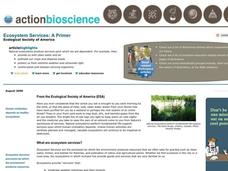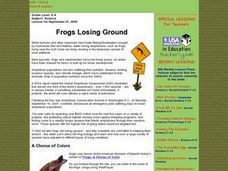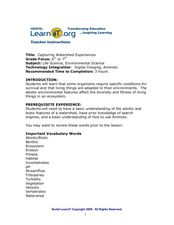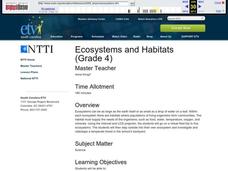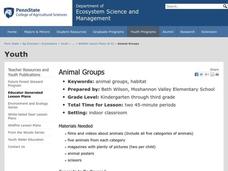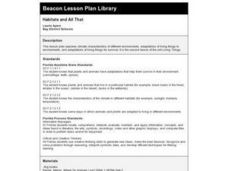Curated OER
Birds
Students list marine birds in their area and report on the threats made to these species. In this marine life lesson students compare bird count data and argue either for or against its accuracy.
Curated OER
Careers With an Aquatic Emphasis
Students are introduced to careers with an aquatic emphasis. They take a self-evaluation test on what they enjoy in school to determine which career is right for them. They listen to people in the field discuss what their job is like.
Curated OER
The Great Pond Safari
Students study pond life by visiting a pond and completing an associated worksheet. They play an online game based on the pond learning experience.
Curated OER
Estuary Interviews
Students role play as newscasters to highlight the lives of estuary animals. In this estuary animal instructional activity, students watch local new shows to examine how interviews take place. They research the lives of animals that live...
Curated OER
Animals Finding Rice Paddies
Fourth graders examine the animals who live in rice paddies and create a chart. In this rice lesson, 4th graders link the types of animals living in each ecosystem with a bar graph. Students use colored bars to show animals that live in...
Curated OER
Milkweed and Monarch Butterfly Mania
Students explore Earth science by completing a worksheet in class. In this botany lesson, students identify the relationship between the Milkweed plant and the butterflies which regularly feed on its nutrients. Students visit a list of...
Curated OER
How Much Is an Ecosystem Worth?
Students examine the value of ecosystems. They read and analyze an article, evaluate ecosystem services, research the benefits of biomonitors, and design a public service announcement.
Curated OER
Frogs Losing Ground
Learners explore an exhibit through an interactive program on frogs. They can listen to the different sounds frogs make and the different types of frogs. They search for the types of frogs they find in their local area.
Curated OER
Environment: Rivers of Destiny
Students investigate the results of human intervention with the Mekong. Mississippi, and Amazon rivers. After watching a video about the status of the three rivers, they complete experiments demonstrating the effects of erosion and...
Curated OER
Capturing Watershed Experiences
Learners observe organisms found in the water. For this lesson on organisms, students collect water from local streams and tributaries in order to study the organisms found in the water. As a culminating activity, learners create a...
Curated OER
Dull Duck, Dashing Duck
Students examine the different colors and patterns found on animals bodies, specifically birds. Through discussion, students discover the use of the colors and patterns for protection from predators and the advantages while hunting prey,...
Curated OER
Water and Rice Agriculture
Second graders investigate the agriculture of rice by reading a study guide. In this food making lesson plan, 2nd graders read about the irrigation of rice fields used for harvesting. Students write three sentences about the rice...
Curated OER
Social Studies: Classroom Culture
Sixth graders compose a list of classroom cultural values. They begin with a list of unacceptable behaviors. Each student presents two ideas they think should be part of the class culture. Students try to persuade classmates to accept...
Curated OER
Marvelous Marshes of the Chesapeake
Third graders identify sources of salt water and fresh water that enter the Chesapeake Bay. They build a model watershed and describe how runoff enters the Bay.
Curated OER
Ecosystems and Habitats
Fourth graders go on a virtual field trip to five ecosystems. They investigate and videotape a temperate forest in the school's backyard.
Curated OER
Non Native Species: English Ivy-Landscape Plant or Deadly Killer?
High schoolers examine an area overrun by English Ivy. They explore how invasive species affect an ecosystem. They also study about the lack of biodiversity and how to measure it out in the field.
Curated OER
Frogs: Fact or Folklore
Students discover how frogs are adapted to their environment. They view and discuss a Discovery Channel video on frogs and the myths surrounding frogs. In small, groups they compile data on frogs from the internet to create a Frog Fact...
Curated OER
Investigating Fresh Water Ecosystems
Sixth graders examine the fresh water ecosystems. In this environmental lesson, 6th graders work in groups to collect information about a fresh water ecosystem and report their findings to the class in the form of a brochure.
Curated OER
How Our Water Becomes Polluted
Students list causes of water pollution, discuss how people contribute to water pollution, and explain concept of watershed.
Curated OER
Plant And Animal Adaptations
Students examine plant and animal life while looking at the environments the organismisms live in. They determine how form follows function by looking an aquatic turtle and noticing its feature of adaptation features. They work in groups...
Curated OER
Animal Groups
Students explore animal groups. In this animal science lesson, students use pictures from magazines and classify the animals into five categories. Students share why they categorized the animals the way they did.
Curated OER
There is Room for All
Learners create a poster about the three main uses of forest lands. In this forest lesson plan, students focus on its economic use, environmental use, and recreation use.
Curated OER
Habitats and All That
First graders read books, complete online explorations and discuss the ways in which animals adapt to their habitats in order to survive. They create accordion books, play matching games and dramatize animal adaptations.
Other popular searches
- Wetland Habitats
- Bayou Wetland Habitat
- Wetland Habitat Food Chain
- Ocean and Wetland Habitat
- California Wetland Habitat









